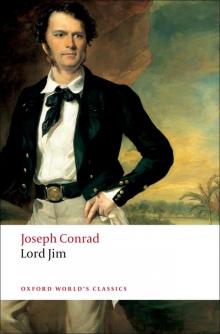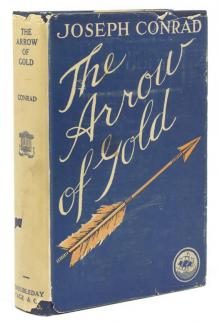- Home
- Joseph Conrad
The Heart of Darkness and the Secret Sharer Page 4
The Heart of Darkness and the Secret Sharer Read online
Page 4
‘‘When we sighted Java Head I had had time to think all those matters out several times over. I had six weeks of doing nothing else, and with only an hour or so every evening for a tramp on the quarter-deck.’’
He whispered, his arms folded on the side of my bed place, staring through the open port. And I could imagine perfectly the manner of this thinking out—a stubborn if not a steadfast operation; something of which I should have been perfectly incapable.
‘‘I reckoned it would be dark before we closed with the land,’’ he continued, so low that I had to strain my hearing near as we were to each other, shoulder touching shoulder almost. ‘‘So I asked to speak to the old man. He always seemed very sick when he came to see me—as if he could not look me in the face. You know, that foresail saved the ship. She was too deep to have run long under bare poles. And it was I that managed to set it for him. Anyway, he came. When I had him in my cabin—he stood by the door looking at me as if I had the halter round my neck already—I asked him right away to leave my cabin door unlocked at night while the ship was going through Sunda Straits. There would be the Java coast within two or three miles, off Angier Point. I wanted nothing more. I’ve had a prize for swimming my second year in the Conway.’’
‘‘I can believe it,’’ I breathed out.
‘‘God only knows why they locked me in every night. To see some of their faces you’d have thought they were afraid I’d go about at night strangling people. Am I a murdering brute? Do I look it? By Jove! If I had been he wouldn’t have trusted himself like that into my room. You’ll say I might have chucked him aside and bolted out, there and then—it was dark already. Well, no. And for the same reason I wouldn’t think of trying to smash the door. There would have been a rush to stop me at the noise, and I did not mean to get into a confounded scrimmage. Somebody else might have got killed—for I would not have broken out only to get chucked back, and I did not want any more of that work. He refused, looking more sick than ever. He was afraid of the men, and also of that old second mate of his who had been sailing with him for years—a gray-headed old humbug; and his steward, too, had been with him devil knows how long— seventeen years or more—a dogmatic sort of loafer who hated me like poison, just because I was the chief mate. No chief mate ever made more than one voyage in the Sephora, you know. Those two old chaps ran the ship. Devil only knows what the skipper wasn’t afraid of (all his nerve went to pieces altogether in that hellish spell of bad weather we had)—of what the law would do to him—of his wife, perhaps. Oh, yes! she’s on board. Though I don’t think she would have meddled. She would have been only too glad to have me out of the ship in any way. The ‘brand of Cain’ business, don’t you see. That’s all right. I was ready enough to go off wandering on the face of the earth— and that was price enough to pay for an Abel of that sort. Anyhow, he wouldn’t listen to me. ‘This thing must take its course. I represent the law here.’ He was shaking like a leaf. ‘So you won’t?’ ‘No!’ ‘Then I hope you will be able to sleep on that,’ I said, and turned my back on him. ‘I wonder that you can,’ cries he, and locks the door.
‘‘Well after that, I couldn’t. Not very well. That was three weeks ago. We have had a slow passage through the Java Sea; drifted about Carimata for ten days. When we anchored here they thought, I suppose, it was all right. The nearest land (and that’s five miles) is the ship’s destination; the consul would soon set about catching me; and there would have been no object in bolting to these islets there. I don’t suppose there’s a drop of water on them. I don’t know how it was, but tonight that steward, after bringing me my supper, went out to let me eat it, and left the door unlocked. And I ate it—all there was, too. After I had finished I strolled out on the quarter-deck. I don’t know that I meant to do anything. A breath of fresh air was all I wanted, I believe. Then a sudden temptation came over me. I kicked off my slippers and was in the water before I had made up my mind fairly. Somebody heard the splash and they raised an awful hullabaloo. ‘He’s gone! Lower the boats! He’s committed suicide! No, he’s swimming.’ Certainly I was swimming. It’s not so easy for a swimmer like me to commit suicide by drowning. I landed on the nearest islet before the boat left the ship’s side. I heard them pulling about in the dark, hailing, and so on, but after a bit they gave up. Everything quieted down and the anchorage became as still as death. I sat down on a stone and began to think. I felt certain they would start searching for me at daylight. There was no place to hide on those stony things—and if there had been, what would have been the good? But now I was clear of that ship, I was not going back. So after a while I took off all my clothes, tied them up in a bundle with a stone inside, and dropped them in the deep water on the outer side of that islet. That was suicide enough for me. Let them think what they liked, but I didn’t mean to drown myself. I meant to swim till I sank— but that’s not the same thing. I struck out for another of these little islands, and it was from that one that I first saw your riding light. Something to swim for. I went on easily, and on the way I came upon a flat rock or two above water. In the daytime, I dare say, you might make it out with a glass from your poop. I scrambled up on it and rested myself for a bit. Then I made another start. That last spell must have been over a mile.’’
His whisper was getting fainter and fainter, and all the time he stared straight out through the porthole, in which there was not even a star to be seen. I had not interrupted him. There was something that made comment impossible in his narrative, or perhaps in himself; a sort of feeling, a quality, which I can’t find a name for. And when he ceased, all I found was a futile whisper: ‘‘So you swam for our light?’’
‘‘Yes—straight for it. It was something to swim for. I couldn’t see any stars low down because the coast was in the way, and I couldn’t see the land, either. The water was like glass. One might have been swimming in a confounded thousand-feet deep cistern with no place for scrambling out anywhere; but what I didn’t like was the notion of swimming round and round like a crazed bullock before I gave out; and as I didn’t mean to go back . . . No. Do you see me being hauled back, stark naked, off one of these little islands by the scruff of the neck and fighting like a wild beast? Somebody would have got killed for certain, and I did not want any of that. So I went on. Then your ladder——’’
‘‘Why didn’t you hail the ship?’’ I asked, a little louder.
He touched my shoulder lightly. Lazy footsteps came right over our heads and stopped. The second mate had crossed from the other side of the poop and might have been hanging over the rail for all we knew.
‘‘He couldn’t hear us talking—could he?’’ My double breathed into my very ear, anxiously.
His anxiety was an answer, a sufficient answer, to the question I had put to him. An answer containing all the difficulty of that situation. I closed the porthole quietly, to make sure. A louder word might have been overheard.
‘‘Who’s that?’’ he whispered then.
‘‘My second mate. But I don’t know much more of the fellow than you do.’’
And I told him a little about myself. I had been appointed to take charge while I least expected anything of the sort, not quite a fortnight ago. I didn’t know either the ship or the people. Hadn’t had the time in port to look about me or size anybody up. And as to the crew, all they knew was that I was appointed to take the ship home. For the rest, I was almost as much of a stranger on board as himself, I said. And at the moment I felt it most acutely. I felt that it would take very little to make me a suspect person in the eyes of the ship’s company.
He had turned about meantime; and we, the two strangers in the ship, faced each other in identical attitudes.
‘‘Your ladder——’’ he murmured, after a silence. ‘‘Who’d have thought of finding a ladder hanging over at night in a ship anchored out here! I felt just then a very unpleasant faintness. After the life I’ve been leading for nine weeks, anybody would have got out of condition. I wasn’t capable of swimming ro
und as far as your rudder chains. And, lo and behold! there was a ladder to get hold of. After I gripped it I said to myself, ‘What’s the good?’ When I saw a man’s head looking over I thought I would swim away presently and leave him shouting—in whatever language it was. I didn’t mind being looked at. I—I liked it. And then you speaking to me so quietly—as if you had expected me—made me hold on a little longer. It had been a confounded lonely time—I don’t mean while swimming. I was glad to talk a little to somebody that didn’t belong to the Sephora. As to asking for the captain, that was a mere impulse. It could have been no use, with all the ship knowing about me and the other people pretty certain to be round here in the morning. I don’t know—I wanted to be seen, to talk with somebody, before I went on. I don’t know what I would have said. . . . ‘Fine night, isn’t it?’ or something of the sort.’’
‘‘Do you think they will be round here presently?’’ I asked with some incredulity.
‘‘Quite likely,’’ he said, faintly.
He looked extremely haggard all of a sudden. His head rolled on his shoulders.
‘‘H’m. We shall see then. Meantime get into that bed,’’ I whispered. ‘‘Want help? There.’’
It was a rather high bed place with a set of drawers underneath. This amazing swimmer really needed the lift I gave him by seizing his leg. He tumbled in, rolled over on his back, and flung one arm across his eyes. And then, with his face nearly hidden, he must have looked exactly as I used to look in that bed. I gazed upon my other self for a while before drawing across carefully the two green serge curtains which ran on a brass rod. I thought for a moment of pinning them together for greater safety, but I sat down on the couch, and once there I felt unwilling to rise and hunt for a pin. I would do it in a moment. I was extremely tired, in a peculiarly intimate way, by the strain of stealthiness, by the effort of whispering and the general secrecy of this excitement. It was three o’clock by now and I had been on my feet since nine, but I was not sleepy; I could not have gone to sleep. I sat there, fagged out, looking at the curtains, trying to clear my mind of the confused sensation of being in two places at once, and greatly bothered by an exasperating knocking in my head. It was a relief to discover suddenly that it was not in my head at all, but on the outside of the door. Before I could collect myself the words ‘‘Come in’’ were out of my mouth, and the steward entered with a tray, bringing in my morning coffee. I had slept, after all, and I was so frightened that I shouted, ‘‘This way! I am here, steward,’’ as though he had been miles away. He put down the tray on the table next the couch and only then said, very quietly, ‘‘I can see you are here, sir.’’ I felt him give me a keen look, but I dared not meet his eyes just then. He must have wondered why I had drawn the curtains of my bed before going to sleep on the couch. He went out, hooking the door open as usual.
I heard the crew washing decks above me. I knew I would have been told at once if there had been any wind. Calm, I thought, and I was doubly vexed. Indeed, I felt dual more than ever. The steward reappeared suddenly in the doorway. I jumped up from the couch so quickly that he gave a start.
‘‘What do you want here?’’
‘‘Close your port, sir—they are washing decks.’’
‘‘It is closed,’’ I said, reddening.
‘‘Very well, sir.’’ But he did not move from the doorway and returned my stare in an extraordinary, equivocal manner for a time. Then his eyes wavered, all his expression changed, and in a voice unusually gentle, almost coaxingly:
‘‘May I come in to take the empty cup away, sir?’’
‘‘Of course!’’ I turned my back on him while he popped in and out. Then I unhooked and closed the door and even pushed the bolt. This sort of thing could not go on very long. The cabin was as hot as an oven, too. I took a peep at my double, and discovered that he had not moved, his arm was still over his eyes; but his chest heaved; his hair was wet; his chin glistened with perspiration. I reached over him and opened the port.
‘‘I must show myself on deck,’’ I reflected.
Of course, theoretically, I could do what I liked, with no one to say nay to me within the whole circle of the horizon; but to lock my cabin door and take the key away I did not dare. Directly I put my head out of the companion I saw the group of my two officers, the second mate barefooted, the chief mate in long India-rubber boots, near the break of the poop, and the steward halfway down the poop ladder talking to them eagerly. He happened to catch sight of me and dived, the second ran down on the main-deck shouting some order or other, and the chief mate came to meet me, touching his cap.
There was a sort of curiosity in his eye that I did not like. I don’t know whether the steward had told them that I was ‘‘queer’’ only, or downright drunk, but I know the man meant to have a good look at me. I watched him coming with a smile which, as he got into point-blank range, took effect and froze his very whiskers. I did not give him time to open his lips.
‘‘Square the yards by lifts and braces before the hands go to breakfast.’’
It was the first particular order I had given on board that ship; and I stayed on deck to see it executed, too. I had felt the need of asserting myself without loss of time. That sneering young cub got taken down a peg or two on that occasion, and I also seized the opportunity of having a good look at the face of every foremast man as they filed past me to go to the after braces. At breakfast time, eating nothing myself, I presided with such frigid dignity that the two mates were only too glad to escape from the cabin as soon as decency permitted; and all the time the dual working of my mind distracted me almost to the point of insanity. I was constantly watching myself, my secret self, as dependent on my actions as my own personality, sleeping in that bed, behind that door which faced me as I sat at the head of the table. It was very much like being mad, only it was worse because one was aware of it.
I had to shake him for a solid minute, but when at last he opened his eyes it was in the full possession of his senses, with an inquiring look.
‘‘All’s well so far,’’ I whispered. ‘‘Now you must vanish into the bathroom.’’
He did so, as noiseless as a ghost, and then I rang for the steward, and facing him boldly, directed him to tidy up my stateroom while I was having my bath— ‘‘and be quick about it.’’ As my tone admitted of no excuses, he said, ‘‘Yes, sir,’’ and ran off to fetch his dustpan and brushes. I took a bath and did most of my dressing, splashing, and whistling softly for the steward’s edification, while the secret sharer of my life stood drawn up bolt upright in that little space, his face looking very sunken in daylight, his eyelids lowered under the stern, dark line of his eyebrows drawn together by a slight frown.
When I left him there to go back to my room the steward was finishing dusting. I sent for the mate and engaged him in some insignificant conversation. It was, as it were, trifling with the terrific character of his whiskers; but my object was to give him an opportunity for a good look at my cabin. And then I could at last shut, with a clear conscience, the door of my stateroom and get my double back into the recessed part. There was nothing else for it. He had to sit still on a small folding stool, half smothered by the heavy coats hanging there. We listened to the steward going into the bathroom out of the saloon, filling the water bottles there, scrubbing the bath, setting things to rights, whisk, bang, clatter—out again into the saloon—turn the key—click. Such was my scheme for keeping my second self invisible. Nothing better could be contrived under the circumstances. And there we sat; I at my writing desk ready to appear busy with some papers, he behind me out of sight of the door. It would not have been prudent to talk in daytime; and I could not have stood the excitement of that queer sense of whispering to myself. Now and then, glancing over my shoulder, I saw him far back there, sitting rigidly on the low stool, his bare feet close together, his arms folded, his head hanging on his breast—and perfectly still. Anybody would have taken him for me.
I was fascinated by it m
yself. Every moment I had to glance over my shoulder. I was looking at him when a voice outside the door said:
‘‘Beg pardon, sir.’’
‘‘Well!’’ . . . I kept my eyes on him, and so when the voice outside the door announced, ‘‘There’s a ship’s boat coming our way, sir,’’ I saw him give a start—the first movement he had made for hours. But he did not raise his bowed head.
‘‘All right. Get the ladder over.’’
I hesitated. Should I whisper something to him? But what? His immobility seemed to have been never disturbed. What could I tell him he did not know already? . . . Finally I went on deck.
II
The skipper of the Sephora had a thin red whisker all round his face, and the sort of complexion that goes with hair of that color; also the particular, rather smeary shade of blue in the eyes. He was not exactly a showy figure; his shoulders were high, his stature but middling—one leg slightly more bandy than the other. He shook hands, looking vaguely around. A spiritless tenacity was his main characteristic, I judged. I behaved with a politeness which seemed to disconcert him. Perhaps he was shy. He mumbled to me as if he were ashamed of what he was saying; gave his name (it was something like Archbold—but at this distance of years I hardly am sure), his ship’s name, and a few other particulars of that sort, in the manner of a criminal making a reluctant and doleful confession. He had had terrible weather on the passage out—terrible—terrible—wife aboard, too.
By this time we were seated in the cabin and the steward brought in a tray with a bottle and glasses. ‘‘Thanks! No.’’ Never took liquor. Would have some water, though. He drank two tumblerfuls. Terrible thirsty work. Ever since daylight had been exploring the islands round his ship.
‘‘What was that for—fun?’’ I asked, with an appearance of polite interest.
‘‘No!’’ He sighed. ‘‘Painful duty.’’

 Heart of Darkness
Heart of Darkness Lord Jim
Lord Jim The Nigger of the Narcissus (Echo Library)
The Nigger of the Narcissus (Echo Library) Victory (Dover Thrift Editions)
Victory (Dover Thrift Editions) Secret Agent
Secret Agent Nostromo
Nostromo Chance: A Tale in Two Parts
Chance: A Tale in Two Parts Youth
Youth Almayer's Folly
Almayer's Folly The Heart of Darkness and the Secret Sharer
The Heart of Darkness and the Secret Sharer The Arrow of Gold: A Story Between Two Notes
The Arrow of Gold: A Story Between Two Notes The Rescue: A Romance of the Shallows
The Rescue: A Romance of the Shallows The Point Of Honor: A Military Tale
The Point Of Honor: A Military Tale Tales of Unrest
Tales of Unrest Under Western Eyes
Under Western Eyes Gaspar Ruiz
Gaspar Ruiz A Set of Six
A Set of Six Heart of Darkness and the Congo Diary (Penguin Classics)
Heart of Darkness and the Congo Diary (Penguin Classics) Heart of Darkness and Selected Short Fiction
Heart of Darkness and Selected Short Fiction Typhoon
Typhoon Youth, a Narrative
Youth, a Narrative Tomorrow
Tomorrow The Arrow of Gold
The Arrow of Gold The Shadow Line: A Confession
The Shadow Line: A Confession The Rescue
The Rescue Victory (Echo Library)
Victory (Echo Library) The Brute
The Brute Romance
Romance A Personal Record
A Personal Record Lord Jim: A Tale
Lord Jim: A Tale Heart of Darkness and Selected Short Fiction (Barnes & Noble Classics Series)
Heart of Darkness and Selected Short Fiction (Barnes & Noble Classics Series) Within the Tides
Within the Tides The Secret Sharer and Other Stories
The Secret Sharer and Other Stories Falk
Falk Heart of Darkness and The Secret Sharer
Heart of Darkness and The Secret Sharer Chance
Chance An Anarchist
An Anarchist The Secret Agent: A Simple Tale
The Secret Agent: A Simple Tale The Secret Agent
The Secret Agent Complete Works of Joseph Conrad (Illustrated)
Complete Works of Joseph Conrad (Illustrated) Heart of Darkness and the Congo Diary
Heart of Darkness and the Congo Diary Notes on Life & Letters
Notes on Life & Letters Typhoon (Single Story)
Typhoon (Single Story)